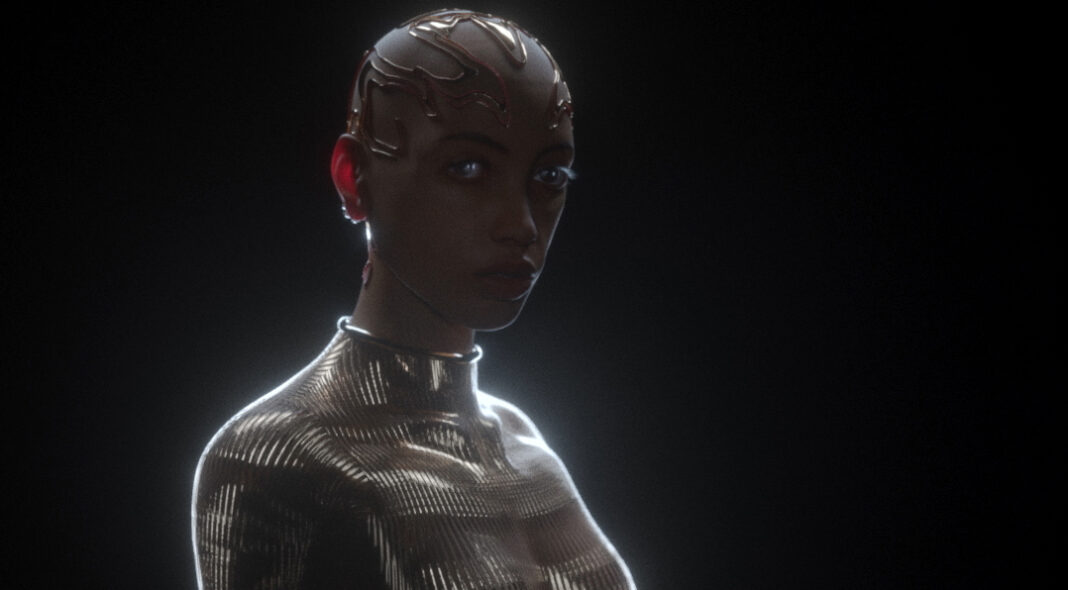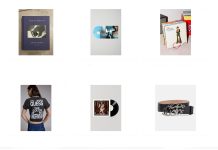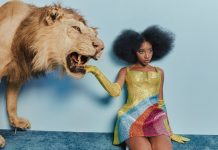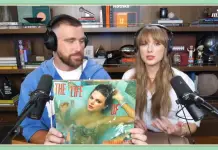The weekend before lockdown Jetta had planned to shoot the video for her new single ‘I Wanna Know.’ Like so many projects it was put on hold. Instead of sitting and waiting in an early lockdown haze of banana bread and Tiger King memes, Jetta set to work on finding a solution. She couldn’t be there physically to shoot the video but what if she could be there digitally?
That’s when Nona was born. An ethereal digital entity whose name spelt backwards is Anon stares out of the video from a universe with worldly elements placed in an intergalactic atmosphere. Nona has “given me a chance to be reborn and to not have any of the pressures associated with how closely linked my music is to me and how I live within myself,” says Jetta. “She’s kind of like a portal or a vessel through which I can live vicariously and relate to.”
Digital avatars have been a mainstay in music since Gorillaz burst onto the scene in 1998 with their cast of misfit virtual characters but until recent years very few musicians have been embracing this pioneering approach. The coronavirus pandemic has changed the way we experience music. With live music events cancelled across the world we are engaging with the digital more than ever, whether we’re watching musicians on Instagram live or streaming new albums on Spotify. Technology has advanced massively since 1998 and the possibilities for digital pop stars are more realistic, versatile and exciting than ever before.
Another early pioneer of digital pop is Hatsune Miku, the world-famous virtual pop star launched by Crypton Future Media in Japan in 2007. She is described by her creators as “a singing synthesiser software that allows any user to generate a singing voice by typing in lyrics over a melody. The software caused a wave of creativity which swept across the net in all sorts of media ranging from music, illustrations, animations, writing, 3D CGI, and more.” Hatsune Miku has toured the world singing any range of songs that fans and songwriters can submit to the database, making her an experiment in accessible and democratic pop.
The artist most recently responsible for bringing digital avatars into the mainstream cultural conscience is Grimes and her avatar War Nymph. They all “come from that DIY, punk mentality,” Jetta explains. “Anything goes. I think that’s definitely a thread between all of us. It’s pushing those boundaries but quite naturally. The outcasts have a spotlight moment in the character that’s made.”
But on Instagram digital avatars aren’t outcasts anymore. A series of digital influencers have gained huge followings modelling designer clothes, advocating for social and political causes and even releasing music. Lil Miquela, who has 2.5 million followers, released her latest single ‘Hard Feelings’ this week. The influencer and pop star was created by Silicon Valley tech start up, Brud. “Digital pop stars are opening new doors for musicians to connect with fans and fans to connect with the music,” a representative from Brud explains. “Music is a universal language, and for Miquela, it acts as a way for her audience to connect even more deeply with her narrative.”
Digital avatars are also readjusting the parameters of live performance and Brud are working on a 360 experience where fans can really connect with Miquela. “Younger audiences struggle with the concept of untouchable celebrities and icons of the past,” Brud’s representative explains. “They want to connect and know what’s really going on in their lives of who they follow – the ins and outs and their beliefs.” However, when the person fans are connecting with isn’t human, how authentic is that connection really? There’s no one person behind Miquela and the world of corporate tech doesn’t always exist in harmony with the more creative side of music. Filmmaker Amelia M Hemphill, who has her own digital avatar that was made when she filmed a BBC documentary about the world of avatars, worries that digital avatars could erode audience trust. “There could be a bit of a backlash on musical artists that are using these avatars because people wonder, well, who’s behind this?” she says.
Overall, though Hemphill is excited by the endless possibilities that digital avatars present: “Avatars are really tapping into our social consciousness at the moment. There is a lot of anxiety about privacy around our identity and how we’re portrayed by others and having an avatar allows you to be a lot more in control of that,” she explains. “The early adopters are going to be the ones who are really reaping the rewards of this.”
It’s interesting that most of these early adopters in music are women, even if sometimes there is a team of men behind them as in Lil Miquela’s case. Women are so scrutinised by the media, particularly with regards to their appearance. Avatars allow female artists to step back from that. After all, one of the motivators behind the creation of War Nymph was Grimes being heavily pregnant in the run-up to her album release. Digital avatars can have a positive influence on how young fans see themselves as well as how they perceive their favourite pop stars. “With an avatar presumably everyone knows it’s not real so you’re not comparing yourself to it,” Hemphill explains. “With a Victoria’s Secret model you’re always going to be comparing yourself because she’s human and that’s human nature. With avatars you’re working in totally different parameters.” She might be right, but on the whole avatars are slim and beautiful. Unrealistically flawless, they give off a vision of perfection that is, for most of us, still utterly unattainable. Creating false aspirational figures whose features are even less attainable than real humans could in fact be even more detrimental to young music fans’ confidence and mental health. The long term impact of integrating avatars into mainstream culture is yet to be seen.
In many ways we have reached the apex of celebrity culture. The past few months have been a turning point, a refocusing on ordinary people and everyday heroes. Influencer marketing specialist Hayley Smith predicts that the rise of avatars in music will overlap with the decline of celebrity culture. “Avatars will change the way we think about celebrity and approach music,” she says. “They will very much shape music trends. People will start to opt for music over the band or artist, removing the celebrity aspect of culture, and focusing solely on the talent.”
The question on everyone’s mind is what will live music look like after the pandemic? Will we ever be able to gig in the same way? Socially distanced arenas are already popping up. Avatar technology could help shape the future of live music. Enabling young people to be present at gigs and festivals without physically being there has been part of Karen Dolva’s objectives since before COVID-19 struck. The inventor, CEO and co-founder of No Isolation has invented an avatar device for chronically ill young people to experience live music with their friends even if they are too unwell to physically be at a gig. The device, which is controlled through an app, can be customised and it lights up in different colours to express different emotions. “No matter what form the avatar takes, it allows you to be present in a moment that you might otherwise have been unable to enjoy,” Dolva explains. “Live music is incredible, but it is also often something that only those that are healthy and well can enjoy. Avatars have the potential to make music events accessible to all, which is what music is really about: uniting us.”
As lockdown eases many of us are craving human connection. We’ve spent over four months living experiences through a screen. Artists across industries have been coming up with creative solutions to share their work. Avatars, that really exist in a space between the physical and the digital, are well placed to play an influential part of music’s new normal. They can push music to places it has never been before, traveling through time and space, creating 360 live experiences and existing in places when we can’t. It hardly matters that they’re not human. With all that to offer it’s time for avatars to take centre stage.







